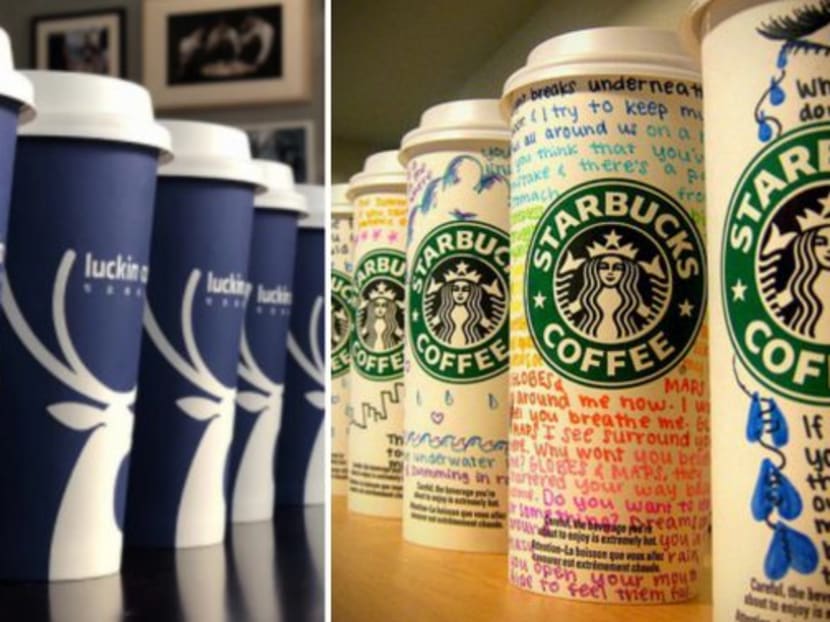Coffee upstart Luckin looks to take on Starbucks in China with ‘new retail’ model
BEIJING — With five million cups sold in four months since its founding, Luckin Coffee – seen as an up-and-coming challenger to Starbucks in China – has had the kind of espresso-charged start to business that any new retailer could wish for.
BEIJING — With five million cups sold in four months since its founding, Luckin Coffee – seen as an up-and-coming challenger to Starbucks in China – has had the kind of espresso-charged start to business that any new retailer could wish for.
The recipe behind its early success is not entirely new though, relying on innovative on-demand services and heavy initial subsidies – both of which have featured in the Beijing-based coffee chain’s roll-out in China.
“Our initial investment will likely exceed one billion yuan (S$208 million),” said Ms Jenny Qian Zhiya, chief executive of Luckin Coffee, in a transcript from a press briefing held in Beijing last month. “We have plenty of cash,” she added, declining to specify exactly how much.
With a large latte priced at 24 yuan, about 20 per cent cheaper than what it costs at its Seattle-based rival, the start-up is very competitive on price. It also has “unlimited” special offers including ‘buy two, get one free’ and ‘buy five, get five free’ for the really thirsty.
Luckin, which offers American-style coffees and a range of bakery items, began soft operations in Beijing and Shanghai at the start of the year. Of the shops opened so far, about 231 or 44 per cent are effectively “take-out kitchens”, according to the company, where coffees are delivered mainly by courier – with a free drink offered if your order doesn’t arrive within half an hour.
However, Ms Qian is adamant the company will not simply be a ‘coffee delivery brand’. “We hope to achieve full coverage of targeted areas with delivery kitchens in the first instance, so that customers can order our coffee,” she said, adding that the take-out kitchens will ultimately only comprise 15 per cent of its network, with full sit-down cafes making up the main bulk.
Ms Qian said an attractive new retail model should “combine online with offline” where customers can sit down and enjoy their coffee at stores, purchase via an app for later pickup, or place direct delivery orders. It should be up to the customer to decide.
Luckin currently has around 525 physical stores in 13 cities, serving 1.3 million customers, says the company, and uses the SF Express delivery firm rather than a proprietary courier service. Before starting Luckin, Ms Qian was chief operating officer of China’s car rental giant CAR Inc and its ride-hailing affiliate UCAR.
“Healthy coffee should be freshly brewed, however cafes are not readily available in China,” said Ms Zhao Yanyan, the company’s spokeswoman. “Luckin Coffee wants to cater to customers at any moment and in a variety of places, whether they’re at work, on a university campus or filling up their car at a gas station.”
Starbucks is currently China’s dominant coffee provider, with a market share of about 58.6 per cent, according to data from Euromonitor International. The Seattle-based firms plans to build about 3,000 new stores in mainland China over the next few years, doubling its current number of 3,300 stores by the end of 2022, according to a company announcement in May.
McCafe, the cafe brand of fast-food restaurant McDonald’s, trails a distant second with 6.1 per cent market share, followed by UK chain Costa Coffee with 3.8 per cent, according to Euromonitor data. The coffee shop market in China is estimated to be worth over US$4.5 billion as of last year, thanks to years of booming growth.
“Starbucks is a great company and has done tremendously well, especially in educating Chinese consumers about coffee,” said Ms Qian in the transcript. “But it does not equal coffee in China and neither is it the sole contender,” she said, adding that all countries have local coffee brands, some of which – like Tim Hortons in Canada or Gloria Jeans in Australia – have an even bigger domestic market share.
Despite the friendly words for Starbucks, Luckin has filed a law suit against its Seattle-based rival for alleged monopolistic practices in China, including signing exclusive rental contracts that block property owners from leasing to another coffee brand. Luckin hired a law firm to represent it and take proceedings forward last month. SOUTH CHINA MORNING POST







